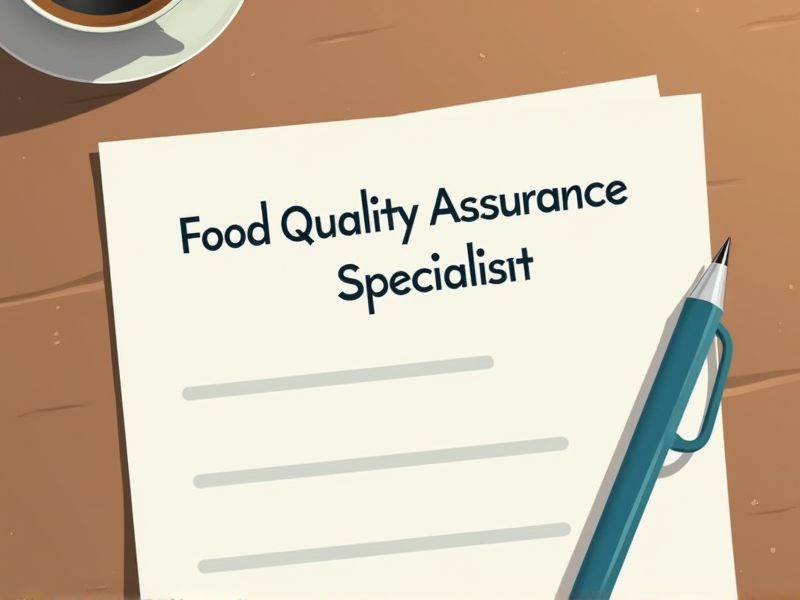
A Food Quality Assurance Specialist plays a crucial role in maintaining food safety standards and ensuring product compliance with regulatory requirements. They need specific certifications to validate their knowledge of safety protocols and industry regulations. Without these certifications, they may struggle to effectively analyze and implement quality control measures. Here are some important certifications required for a Food Quality Assurance Specialist.
HACCP Certification
HACCP Certification equips Food Quality Assurance Specialists with a systematic approach to identifying and controlling potential hazards in food production. This certification enhances their credibility by demonstrating expertise in maintaining food safety standards. As a result, companies are better positioned to prevent contamination, ensuring consumer safety and compliance with regulations. Employers often prioritize certified specialists, which can lead to better career opportunities in the food industry.
SQF Practitioner Certification
The SQF Practitioner Certification ensures a Food Quality Assurance Specialist is well-versed in the Safe Quality Food (SQF) Program standards, boosting credibility. When certified, specialists demonstrate a clear understanding of compliance and risk management, which strengthens food safety protocols. Achieving this certification often results in improved operations and reduced audit non-conformities, which can enhance a food company's reputation and profitability. Certified specialists possess the skills to effectively implement and maintain food safety plans, which directly impacts overall product quality and consumer safety.
BRCGS Food Safety Certification
BRCGS Food Safety Certification provides a standardized framework which increases a Food Quality Assurance Specialist's ability to ensure consistent quality and safety in food production. This certification enhances credibility, making it easier for specialists to build trust with customers and regulatory authorities. It addresses global food safety issues, equipping specialists with the knowledge to identify and manage risks effectively. Certification facilitates market access for food products globally, aiding specialists in meeting diverse international regulatory requirements.
ISO 22000 Lead Auditor Certification
Achieving the ISO 22000 Lead Auditor Certification equips a Food Quality Assurance Specialist with a globally recognized standard for food safety management systems, enabling enhanced credibility in the industry. This certification provides comprehensive knowledge of auditing techniques and best practices, ensuring that specialists can effectively identify and address potential risks in food production processes. It facilitates improved compliance with international food safety regulations, reducing the likelihood of health hazards and recalls. Additionally, possessing this certification can open career advancement opportunities as organizations increasingly prioritize certified professionals for their commitment to quality assurance.
FSSC 22000 Certification
FSSC 22000 Certification enhances the credibility of a Food Quality Assurance Specialist by validating their commitment to international food safety standards. This certification promotes systematic development and implementation of food safety management systems, thereby reducing potential food safety risks. It also builds consumer trust by ensuring consistent food quality, consequently improving market access and competitiveness. Achieving this certification ensures alignment with regulatory requirements and industry best practices, fostering a culture of continuous improvement in food safety.
ServSafe Food Protection Manager Certification
ServSafe Food Protection Manager Certification ensures a Food Quality Assurance Specialist understands crucial food safety principles and regulations. This certification equips them to identify and manage potential risks in food handling and processing, reducing contamination chances. Holding this credential often meets regulatory requirements for food safety protocols in many jurisdictions. It also boosts credibility, showing commitment to maintaining high food safety and quality standards within an organization.
NSF Food Safety Certification
NSF Food Safety Certification enhances a Food Quality Assurance Specialist's credibility in managing food safety protocols. By obtaining certification, specialists can better ensure regulatory compliance, reducing the risk of foodborne illnesses. The certification provides updated knowledge on best practices, which strengthens the specialist's ability to maintain high-quality food standards. Employers often seek certified individuals, indicating the value of certification in career advancement within the food industry.
ASQ Certified Quality Auditor (CQA)
The ASQ Certified Quality Auditor (CQA) certification equips Food Quality Assurance Specialists with advanced auditing skills, enhancing their ability to assess quality processes effectively. This certification indicates a thorough understanding of audit principles and practices, ensuring that food safety and quality standards are consistently met. It often leads to improved process efficiency and helps in identifying potential areas of risk in the food supply chain. Employers value the CQA credential as it signifies a commitment to maintaining high-quality standards in food production.
Lean Six Sigma Green Belt Certification
Lean Six Sigma Green Belt Certification equips Food Quality Assurance Specialists with expertise in reducing waste, leading to more efficient processes in food production. The certification enhances problem-solving skills, which are crucial for identifying and resolving quality issues. It provides a structured approach to ensuring compliance with food safety regulations, minimizing the risk of non-compliance penalties. With a focus on continuous improvement, it helps maintain high standards of food quality, fostering consumer trust and loyalty.
Food Safety Preventive Controls Alliance (FSPCA) Certification
Food Quality Assurance Specialists need FSPCA Certification because it equips them with a comprehensive understanding of the regulations set by the FDA's Food Safety Modernization Act. The certification provides them with the skills to develop and implement effective preventive controls, minimizing the risk of food safety issues. By holding this certification, specialists can ensure compliance with industry standards, thereby protecting public health. Certification also enhances credibility, which can lead to better career opportunities within the food industry.
Summary
When you, as a Food Quality Assurance Specialist, acquire certifications, your expertise in food safety and quality standards enhances. This validation of skills boosts your credibility, leading to increased trust from employers and clients. You may experience greater career advancement opportunities, including potential salary increases. The certifications also enable you to implement more efficient and effective quality control processes, reducing errors and ensuring compliance.
